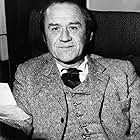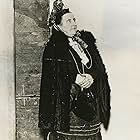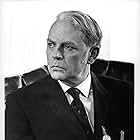A wounded Irish nationalist leader attempts to evade police following a failed robbery in Belfast.A wounded Irish nationalist leader attempts to evade police following a failed robbery in Belfast.A wounded Irish nationalist leader attempts to evade police following a failed robbery in Belfast.
- Nominated for 1 Oscar
- 4 wins & 2 nominations total
Featured reviews
Johnny is one of Mason's best roles especially during the early part of the film but he is submerged in the second half by a string of exaggerated supporting characters that include a demented painter Lukey (Robert Newton) who wants to paint his death mask, a priest (W.G. Fay) who wants to save his soul, sisters Rosie and Maudie (Fay Compton and Beryl Measor) who give him shelter but force him out, and con man Shell (F.J. McCormick) who wants to use him to make money. Odd Man Out is not a political film or even a suspense thriller but a surreal allegory of the limits of man's compassion. When Lukey looks at Johnny and says, "I understand what I see in him. The truth about us all", we can see ourselves -- running for our life, scared and alone, awaiting the encroaching night.
The camera angles are particularly interesting. Shot at ground level, looking up. Shot from above looking down. Shadows dance around corners. Perspective is distorted.
Certainly this was James Mason's best role and he shines as the man not used to daylight, (from rotting in prison for many years), who must lead a daring daylight raid that fails, because the sun gets in his eyes at the critical moment.
The rest of the film is built on what happens to Mason next. He meets many characters who use him for their own ends. He becomes a metaphor. The helpless victim in an almost Kafka-esk world.
Newton is, as always, visually arresting. His mastery over the spoken language is stunning here as he cajoles Mason to sit for his portrait.
The end of this film is classic and shocking and should never be revealed. It must be seen with no fore-knowledge for the best effect.
No longer available for purchase, your best bet to see this extraordinary film is to find a Video rental outlet that specializes in British film. Well worth the effort. A MUST SEE for James Mason/Robert Newton fans and for people who love original film work.
An unnamed organisation (the IRA) in an unnamed Norhern Irish city (Belfast) carry out an armed robbery that goes wrong. Johnny ends up shot, dying and on the run. The movie tracks the multiple stalking of this wounded, dying creature. Everyone wants a piece of him for different reasons.
Why the IRA and Belfast aren't named I don't know - perhaps the politics of the time caused this.
Some aspects of the movie have dated somewhat, but much of it remains gripping and fascinating.
Harold Pinter refers to it constantly in his play Old Times and you can imagine that a young Pinter would have been influenced by this movie.
Check this one out, for sure.
Essentially what Reed and Company have done is create a dark and gloomy urban landscape and made it seductive, even precious to us, by making us care about the people we meet there. Not that these are especially likable people. Many of them aren't, but they're presented fairly and, till near the end, without too much melodrama; and the way they're offered to us, which is to say their environments, vastly warmer and more enticing than the cold night streets the bleeding fugitive is staggering through, create a series of dramatic contrasts between the real world most of us have to move through, and the more imaginative, safer worlds of our homes, where we can retreat to, and imagine we are something else. The wounded Johnny McQueen can afford no such luxury on this bitter night, as each little warm nest offers, for a brief while, a ray of hope that this time he will come in from the cold for good, get warm, rest a little, have his wounds taken care of, and maybe even, if he gets really lucky, find himself a warm bed to sleep in.
Alas, this is not Johnny McQueen's night. Some of the people he encounters treat him decently enough for a while, till they figure out who he is, and then calculation sets in, and selfishness wins out in the end. The film is full of the kind of nocturnal yearnings anyone who has ever lived in a cold city feels as he walks the streets, whether to a pub or train station, home or restaurant, wondering what on earth he is doing out on a night such as this. One goes past this little rowhouse on a sidewalk, or that little walk-down cafe, and looks in the window, sees the people inside, and wishes one were there. Yet cold nights have their pleasures, and even rain has a beauty, as puddles reflect the light of streetlamps and rain-streaked windows make rooms that much more inviting.
Odd Man Out takes these moods, and the musings that accompany them, and raises everything to the max. Johnny isn't merely a man walking down a street, he's a hunted criminal. As we feel as he does, everything comes more intensely into focus than it would normally; as a phone booth can look like the most wonderful place in the world when the snow starts falling. The film makes us see and feel things as we seldom do in normal life, and the result is a kind of compulsive aestheticism that may well be accidental. Anything is or can be beautiful under the right circumstances, and all interior places are inviting when the temperature drops, one hasn't eaten in hours. I suspect that this wasn't the film-makers' intention, that they were hunting bigger game, looking for larger meanings, and the trappings of their picture were intended perhaps as incidental pleasures, or maybe not as pleasures at all. But it is precisely these things,--the visual tropes, not the philosophical and theological underpinnings--that I find most interesting and gratifying about the movie. In the end films have their own meaning, and this one makes me more attentive to the smaller things in life rather than the larger issues; to snow, rain, beer, to boots and overcoats, to the thin white blankets of snow that drape cities on winter nights.
Did you know
- TriviaJames Mason called this his best performance of his career, and his favorite Sir Carol Reed film.
- GoofsWhilst Johnny is on the lam, there's a relentless heavy downpour. However, as Kathleen is looking for him during this time, there's no rain at all.
- Quotes
Johnny McQueen: I remember. When I was a child, I spoke as a child, I thought as a child, I understood as a child. But when I became a man, I put way childish things. Though I speak with the tongues of men and of angels and have not charity, I am become a sounding brass or a inkling cymbal. Though I have the gift of prophecy and understand all mysteries and all knowledge and though I have all faiths so that I could remove mountains and have not charity... I am nothing.
- Crazy creditsOpening credits prologue: This story is told against a background of political unrest in a city of Northern Ireland.
It is not concerned with the struggle between the law and an illegal organisation, but only with the conflict in the hearts of the people when they become unexpectedly involved.
- Alternate versionsThere is an Italian edition of this film on DVD, distributed by DNA srl, "TRENO DI NOTTE PER MONACO (Night Train to Munich, 1940) + ODD MAN OUT (Fuggiasco, 1947)" (2 Films on a single DVD), re-edited with the contribution of film historian Riccardo Cusin. This version is also available for streaming on some platforms.
- ConnectionsFeatured in Performance (1970)
Details
Box office
- Gross worldwide
- $65,759
- Runtime
- 1h 56m(116 min)
- Color
- Aspect ratio
- 1.33 : 1





























